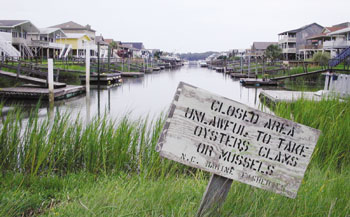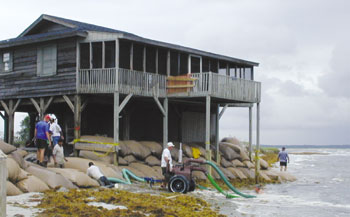

A publication of The Graduate School, University of North Carolina at Chapel Hill
Archives Spring 2002
Home | Back issues | About us | Email your feedback | The Graduate School | UNC-Chapel Hill | Make a gift
Coastal Planning: A Delicate Balance
When it came time to do his dissertation, Richard K. “Dick” Norton headed for the beach — but not for a vacation. Instead, Norton studied and assisted state and local government efforts to develop and implement land-use plans along the coast.
 |
 |
| Photos courtesy of Dick Norton | |
| Planners like Dick Norton try to
strike a balance between coastal development and environmental preservation. |
A North Carolina household tackles the problems emerging from building in a highly erodible area. |
Now an assistant professor
of urban and regional planning at the University of Michigan at Ann Arbor,
Norton says his involvement in North Carolina coastal management enabled
him to get his feet wet in a region of special interest to many North
Carolinians.
“People are drawn to sensitive areas like coastal or mountainous regions for the very reasons that make them so fragile in the first place,” Norton says. “The land use debates are really heightened.”
In 1974, the North Carolina
General Assembly passed the Coastal Area Management Act, a coastal management
program that required each coastal county to develop and regularly update
a plan to accommodate and manage growth throughout the region. The plans
were developed, but some in the environmental community questioned the
thoroughness of their implementation.
“Nobody had done a systematic
study to see how well these plans were being implemented since the program
started 25 years ago,” Norton explains. So Norton decided to see
for himself.
His ambitious research project
included a detailed evaluation of 40 coastal county and municipal plans
and phone surveys of 36 county and town managers and planning directors.
Norton had just begun investigating the state of local planning in the
present, when he suddenly found an opportunity to become a part of shaping
the future.
“The state put a moratorium
on the planning process because the program was becoming increasingly
controversial,” Norton said. “They convened a stakeholder group
of local officials, environmentalists and planning consultants to revisit
the state’s planning rules. This became an ideal way for me to study
in-depth what was going on just by attending these meetings.”
Although he wasn’t a formal
member of the 12-person stakeholder group that met over an 18-month span,
Norton was allowed to listen to and eventually contribute to the discussions.
“I’d hear them talking about something that I knew from my work
as a policy analyst and planner, and say: ‘You folks are talking
about doing something that’s been tried in other places; and it has
these strengths and weaknesses,’” Norton said. “It really
was a two-way street. Sometimes I would ask them questions in an attempt
to understand why they were doing things a certain way. So it was an ongoing
dialogue.”
As a result, Norton had a noticeable
impact on the proceedings. “I wouldn’t say that I guided the
group in any way, but I do think that I made some positive contributions
to the planning review team’s efforts and to the proposed rules that
they worked up.” The members seemed to agree. At the final meeting
in which the group’s proposals were adopted, Norton was introduced
to the crowd and formally recognized for his contributions.
Norton’s dissertation
advisor David Godschalk concurred with their assessment. “One of
the reasons that Dick’s research was so important to the state was
its time-liness,” Godschalk says. “Norton was able to tie his
research into the work of that committee and really did become almost
like a consultant in contributing his perspective.”
Norton’s considerable
versatility didn’t hurt. While pursuing his doctorate in city and
regional planning, he earned a law degree at Carolina. “Because of
the importance of legal issues to the environmental field and local land
use issues,” Norton explains, “I thought it would be very useful
to combine the two.”
“Dick’s having a
law degree was very helpful,” Godschalk agrees. “The fact that
he could combine planning with a knowledge of its legal aspects really
strengthened his recommendations and lent them more weight.”
Norton also found use for his
master’s degrees in public policy and environmental management from
Duke University and seven years of environmental policy consulting in
Washington, D.C., and San Francisco. It was the latter experience that
solidified his interests in local planning. “Environmental policy
involves issues that you really have to struggle with at the local level,
and that usually means land use conflict,” Norton says. “It
asks you to consider: how are you going to let different areas develop,
if at all? How are you going to protect sensitive environmental resources?”
 |
| Photo courtesy of Dick Norton |
While at Carolina, Norton also
gained experience with two years of teaching, won three years of funding
through an Environmental Protection Agency Science To Achieve Results
(STAR) Fellowship, and received a dissertation fellowship award from the
Lincoln Institute for Land Policy.
Considering the credentials and knowledge that Norton displayed at Carolina, it is no surprise that after successfully defending his dissertation and graduating in May 2001, he accepted a tenure-track job as an assistant professor at the University of Michigan. Norton teaches in the Department of Urban and Regional Planning and plans to continue his involvement in coastal management. After all, Norton says, Michigan has a longer coastline than any other state in the country.
But even as Norton moved with his wife and their two young sons to Michigan, North Carolina remained a special place for him. “I think I got an excellent education at Carolina,” Norton said.
As a result, Norton was able to flourish at Carolina and give something back to the state. And Norton is optimistic about the stakeholder group’s impact. “I think North Carolina made some positive steps in trying to make the coastal planning program stronger,” Norton says. “I believe it’s really going to work to protect the coast in the long run.”
-Deborah Makemson
© 2002, The Graduate School, The University of
North Carolina at Chapel Hill
All text and images are property of The Graduate School
at the University of North Carolina-Chapel Hill. Contact Sandra Hoeflich
at shoeflic@email.unc.edu
to request permission for reproduction.
Contact Alexandra Obregon at aobregon@email.unc.edu if you have technical problems with this Web site.